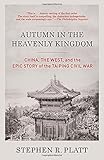Today's selection -- from Autumn in the Heavenly Kingdom by Stephen R. Platt. Taking place at the same time as the American Civil War, the Sepoy Mutiny in India, and the Italian Risorgimento, the Chinese civil war known as the Taiping Rebellion was the bloodiest and most horrifying war of that era. It stemmed, ultimately, from the desperate poverty of millions of Chinese under the rule of the Qing dynasty Manchus, and dwarfed those other conflicts with over twenty million deaths:
"The war that engulfed China from 1851 to 1864 was not only the most destructive war of the nineteenth century, but likely the bloodiest civil war of all time. Known in English as the Taiping Rebellion, it pitted the Chinese rebels of the Taiping Heavenly Kingdom against the waning authority of the two-hundred-year-old Qing dynasty of the Manchus, and in its brutal fourteen-year course at least twenty million people lost their lives to warfare and its attendant horrors of famine and pestilence. In terms of the U.S. Civil War, with which it coincided in its final years, the death toll of the Chinese civil war was at least thirty times as high. ...
"These characters [in this war] range from a Taiping prime minister who spoke English, preached Christianity, and dreamed of a China with free trade and railroads and newspapers; to the American mercenaries lured to Shanghai by the rewards of fighting in the Chinese war; to the Western diplomats and missionaries whose attempts to make sense of the strange foreign world around them wound up shaping that world in permanent ways. On the dynasty's side, the [main] character is Zeng Guofan, the general who rose from a poor farming background to command a personal army every bit as vast, loyal, and ruthless as the army commanded by his counterpart, Ulysses S. Grant, in the United States, and whose power by the end of the war made even Grant look like a lieutenant in comparison. He is one of the most popular historical figures in China today, with dozens of books on his life and letters readily available. ...
"[In another example, British missionaries were dispatched from Shanghai to seek an audience with the Taiping leaders in Nanjing]. These missionaries had long welcomed the destruction of the civil war, because they saw God's hand at work in the Taiping armies. 'Prophecy has said, "I will shake the nations,"' wrote [missionary Joseph] Edkins a few months before his trip to Suzhou, 'and in China there has commenced an era of change, when multitudes are suffering present calamities for the ultimate good of the whole nation?' But it was one thing to reflect on such calamities from the relative safety of Shanghai, another to enter their midst. As the boat edged deeper into the war zone, the heady optimism of the missionaries ran up against countercurrents of horror. It was their fourth night, finally approaching the conquered city of Suzhou, that they would have forgotten if they could. For that was the night that their little boat slowed in its progress, the putrid smell of rot grew and thickened, and finally they came to a stop. Peering out into the twilight by the soft glow of their lanterns, all they could make out on the still surface of the dark water, for hundreds of yards in front of them, were the bodies of the dead -- cold, nameless, and uncountable -- that jammed the canal like so many logs. But there was no turning back. The missionaries pushed their boat forward into the grim mass, oars thudding dully in the blackness, until exhaustion finally overcame them and they had to sleep, there, in the unforgiving embrace of the multitudes."
To subscribe, please click here or text "nonfiction" to 22828.
|
Autumn in the Heavenly Kingdom: China, the West, and the Epic Story of the Taiping Civil War
Author: Stephen R. Platt
Publisher: Vintage
Copyright 2012 by Stephen R. Platt
Pages: xxiii-xxv, 66-67, 79-80

I
f you wish to read further: Buy Now
|

